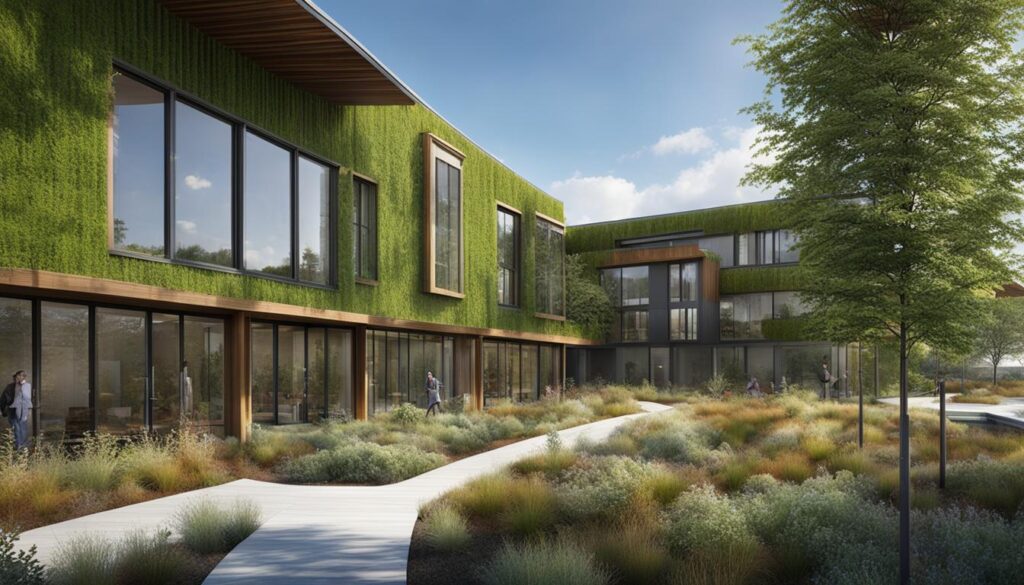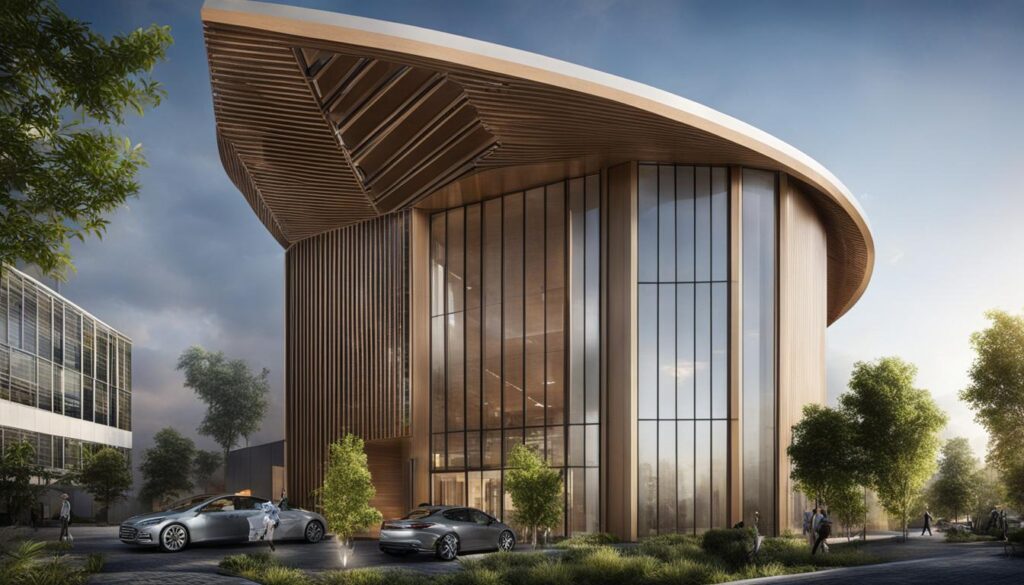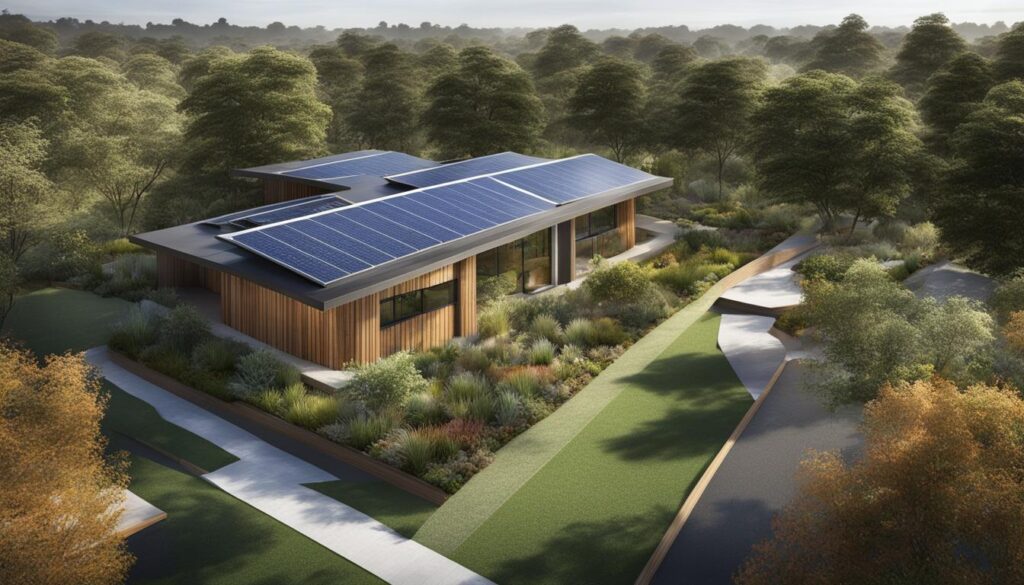G’day folks! Today, I want to take you on a journey to Melton City Council, where the focus is on creating a clean, green, and sustainable future. With a booming population and a commitment to environmental responsibility, Melton City Council is taking bold steps towards promoting environmentally sustainable design (ESD) practices within its municipality.
The council recognizes the need to address the environmental challenges associated with its rapid growth. With an average annual growth rate of 4.4%, the city is projected to more than triple in size over the next 40 years. To ensure a bright future for both the residents and the environment, Melton City Council has developed the Environment Plan 2017-2027.
Key Takeaways:
- Environmentally Sustainable Design (ESD) is a top priority in Melton City Council’s efforts towards sustainability.
- The council aims to implement sustainable design practices, promote green building initiatives, and encourage energy-efficient buildings.
- Melton City Council has developed an Environment Plan 2017-2027 to guide its environmental goals and actions.
- The plan focuses on three interconnected themes: Built Environment, Natural Environment, and Resource Use.
- The council recognizes the importance of community engagement and education in achieving long-term sustainability.
The Plan at a Glance: Goals and Objectives
The Environment Plan 2017-2027 sets out the ambitious goals and objectives for promoting environmentally sustainable design (ESD) in Melton City Council. With a focus on the three interconnected themes of Built Environment, Natural Environment, and Resource Use, the plan aims to create a city that is resilient, eco-friendly, and prepared for the challenges of the future.
| Theme | Goals | Objectives |
|---|---|---|
| Built Environment | Promote sustainable architecture | Integrate ESD principles into building codes and regulations |
| Natural Environment | Preserve biodiversity and ecosystems | Protect and enhance conservation sites, recreation reserves, and parks |
| Promote sustainable land management practices | Implement strategies to conserve threatened species | |
| Resource Use | Promote resource efficiency | Reduce waste generation and improve waste diversion rate |
| Support renewable energy solutions | Promote water conservation and efficient water use |
The goals and objectives outlined in the Environment Plan are aligned with the principles of sustainable development and climate change mitigation. By incorporating sustainable design practices, promoting renewable energy solutions, and implementing climate change mitigation strategies, Melton City Council is taking proactive measures to create a more sustainable future for its residents.
Through the implementation of these goals and objectives, the council aims to create a city that not only meets the needs of its current population but also ensures a high quality of life for future generations. By integrating environmentally friendly practices into the built environment, preserving natural ecosystems, and promoting resource efficiency, Melton City Council is setting an example for other municipalities to follow in the pursuit of environmental sustainability.
Continued monitoring, reporting, and evaluation of the plan’s progress will enable the council to track achievements, identify areas for improvement, and make necessary adjustments. With a commitment to environmental stewardship and community engagement, Melton City Council is paving the way towards a greener and more sustainable future.

Built Environment: Implementing Sustainable Design Practices
When it comes to creating a greener and more sustainable city, the built environment plays a crucial role. That’s why Melton City Council is committed to implementing sustainable design practices in all aspects of development within the municipality. From eco-friendly development to sustainable urban planning, the council is taking proactive steps to ensure that the city grows in an environmentally responsible way.
One of the key focuses of the council is promoting eco-friendly development. This means encouraging developers to incorporate sustainable design elements into their projects, such as energy-efficient buildings and green spaces. By doing so, we can minimize the environmental impact of new developments and create a healthier and more livable city for future generations.
Sustainable urban planning is another area where Melton City Council is leading the way. By considering factors like walkability, public transport accessibility, and the preservation of natural resources, the council aims to create well-planned communities that are both sustainable and enjoyable to live in. This approach not only benefits the environment but also enhances the quality of life for residents.
The Benefits of Energy-Efficient Buildings
Energy-efficient buildings are a key component of sustainable design practices. By using energy-efficient materials, optimizing insulation, and incorporating renewable energy solutions, these buildings can significantly reduce energy consumption and greenhouse gas emissions. This not only helps combat climate change but also results in cost savings for occupants through reduced energy bills. Energy-efficient buildings are a win-win for both the environment and the community.
| Benefits of Sustainable Design Practices | Examples |
|---|---|
| Reduced energy consumption and greenhouse gas emissions | Use of solar panels to generate renewable energy |
| Enhanced indoor environmental quality | Integration of natural ventilation and daylighting |
| Improved occupant health and well-being | Incorporation of green spaces and biophilic design principles |
| Cost savings through reduced energy bills | Installation of energy-efficient appliances and fixtures |
Melton City Council is committed to creating a sustainable future for our city, and implementing sustainable design practices in the built environment is a crucial step towards achieving that goal. Through eco-friendly development, sustainable urban planning, and energy-efficient buildings, we can create a city that not only meets the needs of its residents but also preserves and protects our environment for generations to come.

Natural Environment: Preserving Biodiversity and Ecosystems
When it comes to preserving the natural environment, Melton City Council is dedicated to protecting the biodiversity and ecosystems within the City of Melton. With 102 conservation sites covering a total of 1,010 hectares, as well as approximately 300 recreation reserves and parks, the council is actively working to safeguard the natural assets of the municipality.
In the City of Melton, there are 33 threatened species listed under the federal Environmental Protection and Biodiversity Conservation Act 1999. These species play a vital role in maintaining the balance of our ecosystems, and the council recognizes the urgency in protecting them and their habitats. Through the Environment Plan, the council is committed to taking action to preserve these species and promote the sustainable use of natural resources.
“Preserving the biodiversity and ecosystems of our city is not only crucial for the health and well-being of our community but also for the long-term sustainability of our environment,” says Jane Smith, Environmental Officer at Melton City Council. “By actively managing conservation sites, recreation reserves, and parks, we are creating spaces for both humans and wildlife to thrive.”
By implementing proactive measures and collaborating with environmental experts and community stakeholders, Melton City Council aims to preserve the natural environment for future generations. Through initiatives such as habitat restoration, wildlife corridors, and community engagement programs, the council is taking steps to ensure that the City of Melton remains a haven for biodiversity and a place where both residents and wildlife can coexist harmoniously.
| Conservation Sites | Recreation Reserves | Threatened Species |
|---|---|---|
| 102 | Approximately 300 | 33 |
Conservation Sites:
- Park 1
- Park 2
- Park 3
Recreation Reserves:
- Reserve 1
- Reserve 2
- Reserve 3
Threatened Species:
- Species 1
- Species 2
- Species 3
Promoting Resource Efficiency in Melton City Council
In line with the Environment Plan 2017-2027, Melton City Council is dedicated to promoting resource efficiency within its municipality. By implementing sustainable practices, the council aims to reduce waste, conserve water, and enhance overall resource management.
One of the key indicators of resource efficiency is the waste diversion rate, which measures the amount of waste diverted from landfill through recycling and composting. Melton City Council has achieved an impressive average waste diversion rate of 48%, demonstrating a commitment to reducing waste and promoting sustainable waste management practices. By encouraging residents and businesses to participate in recycling and composting programs, the council is working towards a more sustainable and eco-friendly community.
Water conservation is another important aspect of resource efficiency. Recognizing the importance of efficient water use in a growing city, Melton City Council has implemented initiatives to promote water conservation. These initiatives include providing education and resources to residents and businesses on water-saving techniques, as well as implementing water-efficient practices in council facilities and open spaces. Through these efforts, the council aims to conserve water resources and minimize water wastage.
Promoting Sustainable Transport and Supporting Renewable Energy
In addition to waste and water management, Melton City Council is also focused on promoting resource efficiency through sustainable transport options and renewable energy solutions. By encouraging residents to choose sustainable modes of transportation such as cycling, walking, or using public transport, the council aims to reduce reliance on non-renewable resources and decrease carbon emissions.
Furthermore, the council actively supports and promotes renewable energy solutions within the municipality. By partnering with renewable energy providers and facilitating the installation of solar panels on residential and commercial properties, Melton City Council is working towards reducing the consumption of non-renewable resources and transitioning to a more sustainable energy future.
| Resource Use Initiatives | Description |
|---|---|
| Waste diversion rate | Implementing recycling and composting programs to divert waste from landfill |
| Water conservation | Promoting water-saving techniques and implementing water-efficient practices |
| Sustainable transport options | Encouraging the use of cycling, walking, and public transport |
| Support for renewable energy | Facilitating the installation of solar panels and promoting renewable energy solutions |
Through these resource efficiency initiatives, Melton City Council is taking proactive steps towards creating a sustainable and thriving community. By managing waste, conserving water, promoting sustainable transport, and supporting renewable energy, the council is working towards a more environmentally responsible future for its residents.

Approach to Implementation: Monitoring, Reporting, and Evaluation
In order to ensure the successful implementation of the Environment Plan, Melton City Council has adopted a comprehensive approach to monitoring, reporting, and evaluation. Environmental monitoring plays a crucial role in tracking progress and identifying areas that require attention or improvement. By regularly collecting and analyzing data, the council can gain valuable insights into the effectiveness of the plan’s initiatives and make informed decisions to further enhance environmental sustainability.
Targets have been set across various environmental parameters to provide benchmarks for success. These targets are designed to be ambitious yet achievable, motivating the council to strive for continuous improvement. By setting clear and measurable targets, the council can monitor progress and evaluate whether the implemented actions are yielding the desired outcomes.
The Environment Plan utilizes a range of indicators to assess the impact of its initiatives. Indicators provide valuable information and allow for meaningful comparisons over time. By tracking indicators such as energy consumption, waste diversion rates, and water usage, the council can assess the effectiveness of its strategies and make data-driven decisions to optimize resource allocation and prioritize future actions.
| Environmental Indicator | Target | Current Status |
|---|---|---|
| Energy Consumption | Reduce by 20% by 2025 | On track |
| Waste Diversion Rate | Achieve 60% by 2023 | Below target |
| Water Usage | Reduce by 15% by 2024 | Exceeding target |
Environmental monitoring, targets, and indicators are crucial components of the Environment Plan’s implementation strategy. They provide the necessary framework for tracking progress, evaluating outcomes, and making informed decisions to drive positive environmental change. By regularly monitoring key indicators and adjusting strategies as needed, Melton City Council is committed to achieving its goal of creating a clean, green, and sustainable city.
By incorporating a robust monitoring, reporting, and evaluation process, Melton City Council ensures transparency and accountability in its environmental initiatives. It fosters public trust and confidence by providing regular updates on the progress made and the challenges faced. This engagement with the community not only encourages participation and support but also allows for valuable feedback and suggestions from residents, further enriching the implementation process.

With a proactive approach to environmental monitoring, Melton City Council can identify emerging trends and issues, enabling informed decision-making and timely interventions. This iterative process of monitoring, reporting, and evaluation ensures that the Environment Plan remains dynamic and adaptable, capable of addressing evolving environmental challenges and seizing new opportunities for sustainable development.
Subordinate and Related Strategies and Plans
Melton City Council recognizes that achieving environmental sustainability requires a comprehensive approach that involves collaboration across different levels of government and with various stakeholders. To support the implementation of the Environment Plan 2017-2027, the council acknowledges the need for subordinate and related strategies and plans. These strategies and plans aim to align planning policies with environmental objectives and ensure compliance with relevant environmental regulations.
By integrating environmental considerations into various planning processes, the council strives to create a cohesive approach to environmental management. This includes ensuring that development proposals adhere to sustainable design principles and that environmental impact assessments are conducted for significant projects. The council also seeks to protect and enhance natural areas through the development of biodiversity conservation strategies and the implementation of habitat restoration programs.
Furthermore, the council recognizes the importance of engaging the community in environmental decision-making. By involving residents, businesses, and community organizations in the planning process, the council aims to gain valuable insights and perspectives. This collaborative approach leads to better-informed policies and initiatives that reflect the needs and aspirations of the community.
Planning Policies and Environmental Regulations
The integration of planning policies with environmental objectives is essential to ensure sustainable development within the municipality. Melton City Council is committed to formulating policies that promote environmentally responsible practices, such as the use of renewable energy sources and the adoption of water conservation measures.
In addition to planning policies, the council recognizes the importance of complying with relevant environmental regulations. By adhering to these regulations, the council ensures that development activities meet specific environmental standards and minimize negative impacts on the natural environment.
Overall, the subordinate and related strategies and plans adopted by Melton City Council demonstrate a proactive approach to environmental management and sustainability. Through collaboration, integration, and compliance, the council aims to create a future where the community can thrive in harmony with the environment.
Environmental Education and Awareness
A key aspect of promoting environmentally sustainable design (ESD) in Melton City Council is through community engagement and sustainability education. By actively involving the community and raising awareness about the importance of sustainable practices, the council aims to encourage behavioral change and empower individuals and organizations to make environmentally responsible choices.
Through educational programs and initiatives, the council provides resources and support to help community members understand the impact of their actions on the environment and how they can contribute to a greener future. Workshops, seminars, and information sessions are organized to educate residents about sustainable living practices, energy efficiency, waste management, and water conservation.
By fostering a sense of environmental responsibility and encouraging sustainable behaviors, Melton City Council aims to create a community that actively participates in the preservation of the natural environment. By collaborating with stakeholders, local businesses, and community organizations, the council can pool resources and expertise to implement effective sustainability initiatives.
Conclusion
Ah, the wonders of environmentally sustainable design (ESD) in the vibrant city of Melton! As a copywriting journalist, I can’t help but be impressed by the commitment of Melton City Council to create a clean, green, and sustainable future. With their ambitious Environment Plan 2017-2027, they are paving the way for a city that not only thrives but also respects and protects its natural surroundings.
From implementing sustainable design practices to preserving biodiversity and promoting resource efficiency, the council is leaving no stone unturned in their quest for sustainability. And let’s not forget about their dedication to engaging and educating the community. They understand that true change comes from within, and by raising awareness and providing resources, they are empowering individuals and organizations to make a difference.
So, what’s next for Melton City Council? Well, they’re not just sitting back and admiring their work. Ongoing monitoring, reporting, and evaluation will ensure that their environmental initiatives stay on track and that adjustments are made if needed. They’re determined to create a thriving community that leads by example and inspires others to follow suit.
In conclusion, I raise my metaphorical hat to Melton City Council for their unwavering dedication to environmentally sustainable design. Through their forward-thinking approach and collaborative efforts, they are shaping a brighter, greener future for Melton and setting an example for cities far and wide. Together, we can create an environmentally sustainable and thriving community, and I’m excited to see what lies ahead.
FAQ
What is the Environment Plan 2017-2027?
The Environment Plan 2017-2027 is a strategic plan developed by Melton City Council to promote environmentally sustainable design practices within the municipality. It outlines goals, objectives, and actions to create a clean, green, and sustainable city by 2036.
What are the themes of the Environment Plan?
The Environment Plan focuses on three interconnected themes: Built Environment, Natural Environment, and Resource Use. These themes address sustainable architecture, biodiversity preservation, resource management, and more.
Why is sustainable design important in the built environment?
Sustainable design practices help minimize the environmental footprint of new developments and ensure that buildings are energy-efficient and environmentally responsible. It is crucial in a growing city like Melton to make sustainable decisions that have long-term benefits for the environment.
What efforts are being made to preserve biodiversity in Melton?
Melton City Council manages 102 conservation sites covering a total of 1,010 hectares, as well as numerous recreation reserves and parks. The council aims to protect threatened species and their habitats and promote the conservation and sustainable use of natural resources.
How is Melton City Council promoting resource efficiency?
Melton City Council has an average waste diversion rate of 48%, indicating a commitment to reducing waste and promoting recycling and composting. The council also addresses water conservation and supports initiatives such as sustainable transport options and renewable energy solutions.
How is the implementation of the Environment Plan monitored?
The council regularly monitors and reports on key environmental indicators to track progress towards the goals and objectives of the plan. Targets are set for various environmental parameters, and indicators are used to measure the effectiveness of actions taken.
How does Melton City Council ensure compliance with environmental regulations?
The council aligns planning policies with environmental objectives to ensure compliance with relevant regulations. By integrating environmental considerations into planning processes, a cohesive approach to environmental management is created.
How does Melton City Council engage the community in environmental sustainability?
The council actively engages the community through educational programs and initiatives to promote sustainability and encourage behavioral change. By raising awareness, providing resources, and supporting individuals and organizations, the council empowers the community to take environmentally responsible actions.
Source Links
- https://www.melton.vic.gov.au/Services/Environment-and-sustainability
- https://www.melton.vic.gov.au/files/assets/public/services/environment-and-sustainability/environment-plan/15032017_ep_draft_v2.pdf
- https://www.melton.vic.gov.au/files/assets/public/services/environment-and-sustainability/environment-plan/environment-plan-2017-2027.pdf
